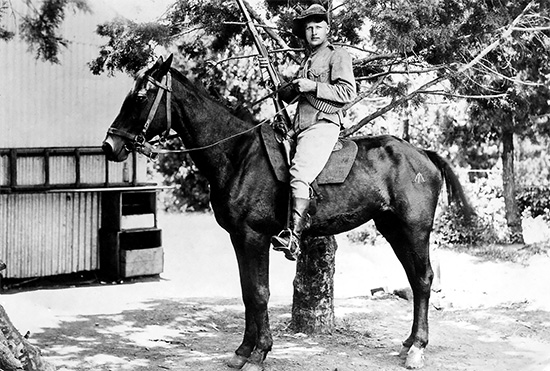Execution.
Heroes Remember
Execution.
Transcript
Picture of six soldiers standing or on a fence.
I mind the time, Harry Morant. I don't think this was ever recorded, I don't suppose the press ever heard it. Interviewer: Well this is a first for it, a first for the UNB Living History Club. Okay give it to me. (What?) This is a first for us then, its going to be recorded now. Now there was poor Harry Morant, a finer horseman, a finer shot, or a finer leader in men. He had orders to go up through the Transvaal take no prisoners. Evans was his, one of his captains wasSoldier holding his rifle on horseback.
surrounded by some of the Boers, and they were surrounded by the Boers and the Boers shot Captain Evans, they shot Captain Evans and when Harry Morant come upon these here, his body was stuck to a post on a corral. That's in a where there they put their cattle or horse young, young horses, or anything like that, the stock. There was a post and his body was up on there riddled with bullets. Well that drove Harry Merant nuts. Interviewer: Well, how was it stuck up there? Was it crucified literally or just... (Well the Boers done) Was it tied there or something. Well, they tied him up on this and then riddled him with shot. The Boers done this. Well that, you see HarrySoldier posing with rifle slung.
Morant was courting Captain Evans' sister and they were going to get married after the war and he thought they was just like brothers and when he seen this, Captain Evans hung up like that, mutilated, it went drove him nuts. You know he just went, he says from now on they'll be not a Boer taken prisoner by me. And he met a Boer... Interviewer: What rank, what rank was he? Was he... (Captain) He was a Captain, too. He was a Captain, Captain Harry Morant. I mind him, I mind him just as well as I was talking to him now. Well sir, they had orders to come back, they was heliographed in to come in bring the troops in. He'd shot, he'd shot one ofPicture of a man standing and a woman sitting, holding flowers.
the Dutch missionaries because he wouldn't tell him whether he'd seen any Boers. And he was ordered in. His whole body was ordered in, by heliograph. And they come in, and Harry was made a prisoner. Interviewer: Then what happened? And Harry was made a prisoner, and they tried to get a reprieve through, get a reprieve from London. But the reprieve didn't come through in time and Harry was shot right there on the square in Pretoria. Is it going there? (It's going there, yes.)Three Veterans standing in front of war memorial.
And I remember seeing Harry and he stood like a man. He stood right before that firing squad and he says, boys shoot straight. That was, that was Harry, that was the kind of a man he was. Interviewer: How did the troops feel? (Well) You were there watching this. How did you feel? Well, I thought that, I thought there wasn't very much justice in it meself. If a man, if a man is fighting, fighting for his life and he's ordered to take no prisoners and he goes out there and does that of course, on the other hand by shooting the Dutch missionary, he was shooting... not a Boer. (Civilian)Boer War Veteran talking with current service men.
He was a civilian and by that means I think perhaps he went a little out of, out of the way. I don't know, I don't know just, I wasn't there when, when the civilian was shot, but that might have been the cause. Interviewer: When the tape recorder was off there, you mentioned that this was one time that maybe the Queenslanders would, would have put all their guns down at, at the front. What, what did you mean by that? (What) You said that when the tape was off there I had a little bit ofBoer War Veteran sitting on a chair, holding a document.
trouble with the tape, you said that, that was the one time when maybe the Queenslanders would, and a lot of soldiers would have put their guns down at the time. Well, I thought meself when I see that action, I thought meself that they would, the troops would, the colonial troops would have piled arms in sympathy, with having a man shot, a man of his calibre and was doing his duty, and was, was doing his very best, conscientiously. Just the same as every other man would. If you're in action, you've got to protect yourself and the ones surrounding you, as best you can. You haven't got to stand on any, any sentiment. (That's right).Description
Mr. Weaver recalls the events leading to his captain Harry Morant being executed after he shot a Dutch Missionary because the Missionary would not tell Harry if he had seen any Boers.
Frank Weaver
Frank Weaver was born in England, April 7th, 1881 and moved to Canada following his service in the South African War. At the time of this interview Mr. Weaver was 97-years-old. This interview was recorded in Saint John, New Brunswick on August 13, 1971 as part of the Living History Project completed by students and faculty of Military and Strategic Studies, Department of History, University of New Brunswick. This interview is used with permission of the Provincial Archives of New Brunswick. Mr. Weaver's interview was taped outdoors. VAC apologizes for the sometimes poor audio quality of these clips.
Meta Data
- Medium:
- Video
- Owner:
- Veterans Affairs Canada
- Duration:
- 05:37
- Person Interviewed:
- Frank Weaver
- War, Conflict or Mission:
- South African War
- Branch:
- Army
Related Videos
- Date modified:




